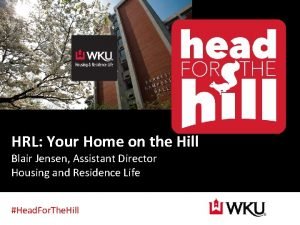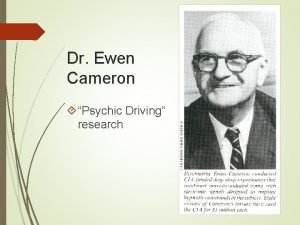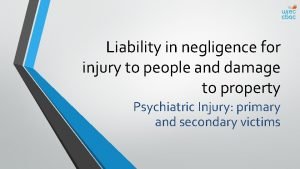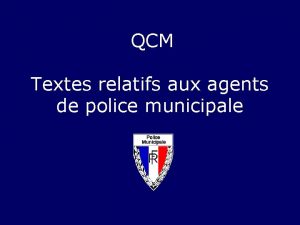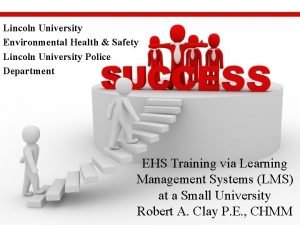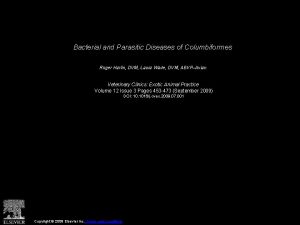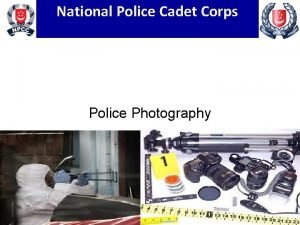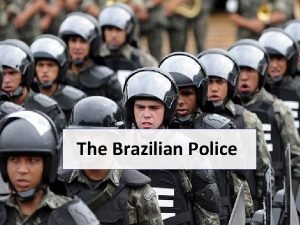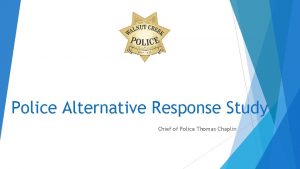Chief Harlin R Mc Ewen Chief of Police









- Slides: 9

Chief Harlin R. Mc. Ewen Chief of Police (Ret) City of Ithaca, NY FBI Deputy Assistant Director (Ret) Washington, DC Phone: (607) 227 -1664 Email: chiefhrm@pubsaf. com Chairman Communications & Technology Committee International Association of Chiefs of Police Public Safety Spectrum Trust Chairman Public Safety Spectrum Trust

NATIONWIDE PUBLIC SAFETY WIRELESS BROADBAND NETWORK National Public Safety Telecommunications Council Alexandria, VA June 14, 2010

Recent and Current Events Public safety has chosen Long Term Evolution (LTE) as the preferred technology for the nationwide network. 4 G technologies like LTE are best suited for bandwidths of greater than 10 MHz. The Public Safety Broadband License is for 10 MHz of spectrum and the public safety community has identified the need for the additional 10 MHz of spectrum in the adjacent D Block to provide the robust data services required by public safety. The public safety community is unified in this effort and has the support of a large segment of the communications industry.

4/20/2010 – Rep. Peter King (R-NY) and Rep. Yvette Clarke (D -NY) introduced H. R. 5081 that would direct the FCC to allocate the 700 MHz D Block to public safety. 4/22/2010 - The FCC authorized the creation of an Emergency Response Interoperability Center (ERIC). ERIC will be housed at the FCC in the Public Safety & Homeland Security Bureau (PSHSB). The FCC plans to establish a Public Safety Advisory Board to serve a central advisory role to ERIC. As proposed, ERIC would coordinate the interoperability framework of regulations, license requirements, grant conditions, and technical standards with other entities (e. g. , the Public Safety Broadband Licensee [Public Safety Spectrum Trust], DHS, NTIA and NIST). The public safety community has given initial support for ERIC but has expressed some reservations and concerns.

The FCC is aggressively supporting the auctioning of the 700 MHz D Block for commercial purposes without the previously identified public safety requirements. The National Broadband Plan proposes that public safety will have access to the entire 700 MHz band for the purposes of roaming and priority access but no requirements for the D Block winner(s) to partner with the nationwide Public Safety Broadband Licensee as required in the Second Report and Order. Several entities, including two major carriers, Sprint Nextel and T-Mobile, and others like Google are advocating that the D Block not be allocated for public safety but instead be auctioned for only commercial purposes. Verizon Wireless and AT&T are advocating the D Block be allocated to public safety.

Eight major public safety organizations have formed a new ad hoc group called the Public Safety Alliance (PSA) to advocate for the Congress to allocate the D Block to Public Safety. The PSA consists of the Association of Public=Safety Communications Officials-International (APCO, International Association of Chiefs of Police (IACP), International Association of Fire Chiefs (IAFC), Major Cities Chiefs Association (MCC), Metropolitan Fire Chiefs Association (Metro Chiefs), Major County Sheriffs’ Association (MCSA), National Emergency Management Association (NEMA) and the National Sheriffs’ Association (NSA). The PSA is being managed by APCO and has the support of many other public safety and industry organizations. More information can be found at a new PSA web site http: //www. psafirst. org

5/11/2010 – The FCC issued an Order giving conditional approval to 21 state and local public safety petitioners to obtain, through a lease from the PSST, access to the 5 MHz x 5 MHz of broadband spectrum licensed to the PSST. Adams County-Denver Airport (CO); Alabama; Bay Area Consortium (CA); Boston (MA); Charlotte (NC); Chesapeake (VA); District of Columbia (DC); Hawaii; Iowa; Los Angeles (CA); Mesa-TOPAZ (AZ); Mississippi; New Jersey, New Mexico; New York City; New York State, Oregon; Pembroke Pines (FL); San Antonio (TX); Seattle (WA); Wisconsin Counties (WI)

06/07/2010 – The Public Safety Spectrum Trust (PSST) conducted a telephone meeting with the representatives of the 21 Waiver Recipients. These 21 representatives are now members of a PSST Operator Advisory Committee (OAC). The OAC will facilitate communication and coordination between the PSST and the Waiver entities as well as coordination among the 21 members. The PSST discussed the proposed budget that would be the basis for Administrative Fees to be charged by the PSST as part of the FCC lease requirements. 06/11/2010 – The PSST submitted a budget proposal to the FCC for the Administrative Fees to be charged the Waiver Recipients. The budget proposes a fee of $15, 000 per lessee with a request that, if necessary, the FCC consider a budget amendment within six months. This is requested because of the many unknowns lying ahead.

Conclusion Public safety needs a nationwide wireless broadband network that gives public access to modern technologies. The network needs to be robust, interoperable, allow nationwide roaming, and be more reliable and secure than current commercial networks. Representatives of the major national public safety organizations are engaged in ongoing discussions with the Federal Communications Commission, the White House and Congress to make sure that the outcome is positive for public safety.
